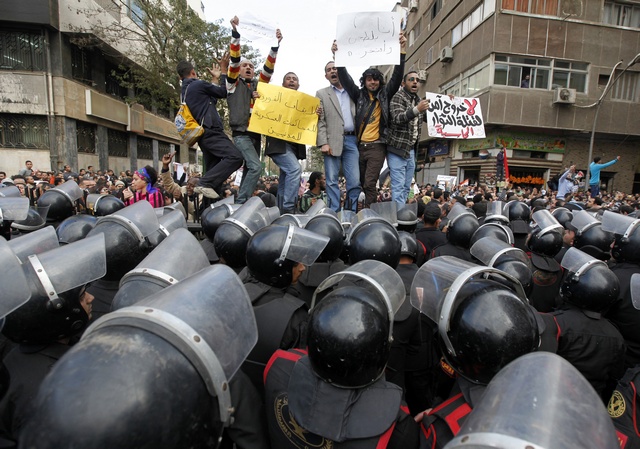
Egypt’s 30-year-old state of emergency came to an end on May 31 as its last renewal expired. However, this human rights victory is only the first step toward reforming a legal system and military justice apparatus that still wield too much control over civilians.
Although the Emergency Law has been allowed to lapse, the SCAF will remain in control until June 30, the deadline for its promised transfer of power to the elected civilian president. Until then, the SCAF said it will continue its "national and historic responsibility, taking into account that the state of emergency has ended, in accordance with the constitutional declaration and with the law.”
Egypt has been under a state of emergency continuously since President Anwar Sadat’s assassination in 1981, allowing civilians to be tried without due process in emergency security courts. Parliament renewed the Emergency Law for two years in May 2010 under Hosni Mubarak’s rule, but limited its application to terrorism and drug crimes. In practice, the Emergency Law was consistently invoked to prosecute and repress opponents of the Mubarak regime.
When the SCAF assumed power after Mubarak’s resignation in February 2011, the SCAF used the specter of political instability and unrest to justify an expansion of the law to include strikes, but then clarified that its application would be limited to "thuggery." But due to the vagueness of the terminology, the SCAF used an expansive definition of “thuggery” to justify the arbitrary arrest of activists and protesters. According to Human Rights Watch, the Interior Ministry is currently detaining at least 188 people held under the Emergency Law.
With the SCAF rapidly approaching the end of its mandate as the interim executive authority, there was little question that the Emergency Law would lapse as promised on its expiration date of May 31. Essam al-Erian, the deputy head of the Muslim Brotherhood’s Freedom and Justice Party, concluded from the military’s statement that the SCAF would not ask parliament to extend the law. The Brotherhood’s presidential candidate Mohamed Morsi had stated previously that the law would not be renewed.
But human rights activists fear that the expiration of the law does not prevent future emergency legislation, nor does it nullify other exceptional legal provisions that were introduced separately. The NGOs Human Rights Watch and Al-Karama issued a joint statement urging the Egyptian Parliament “to pass legislation ending all exceptional measures that would not automatically expire with the law … It should require the interior minister to release all Emergency Law detainees or refer them to prosecutors to be charged, and ask the public prosecutor to transfer all Emergency State Security Court (ESSC) trials to regular civilian courts.”
Other political activists and human rights defenders have asked Egypt’s Prosecutor General as well as the Parliament to open an investigation into all past human rights violations perpetrated under the Emergency Law, included countless cases of torture and kidnapping.
The power to pass new legislation preventing the reactivation of the Emergency Law or any future exceptional measures now lies in the hands of a Parliament dominated by the Muslim Brotherhood, once one of the biggest victims of arbitrary arrests and detention under Mubarak. With the possibility of Mohamed Morsi winning the presidency in a run-off against Ahmed Shafik on June 16-17, there is no reason to assume that the Brotherhood – once an object of repression – will be more tolerant of political opposition than the previous rulings powers. But lifting the state of emergency has been one of the Brotherhood’s flagship objectives for decades, and thus Parliament is extremely unlikely to seek its renewal as long as the Brotherhood majority is in place. However the Brotherhood has been reluctant to directly confront Egypt’s military justice system, which has been used in tandem with the emergency law to repress civilians and political dissidents. On May 6, 2012, Parliament approved amendments to the Code of Military Justice that failed to eliminate provisions allowing the trial of civilians in military courts.
The SCAF’s statement on May 29, saying that only Parliament – not the military – has the power to extent the emergency law throws the ball into the Brotherhood’s court. The SCAF – and by association the military’s preferred candidate, Ahmed Shafik – benefit from the fulfillment of the long-delayed promise of lifting the Emergency Law, while Parliament now bears the burden for deciding the future of emergency legislation in Egypt. And given the Brotherhood’s reluctance to pass legislation ending military trials for civilians, it appears that the expiration of the emergency law is just the first step in a long battle to protest human rights and rule of law in the new Egypt.
Salem Mostafa Kamel is an Egyptian attorney based in Cairo.
Photo Credit: Reuters
Image: 2012_Egypt_protestgenerals.jpg
